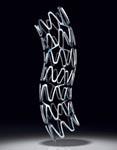
May 26, 2010 – In the constantly evolving battle for the best coronary stent, Boston Scientific said today it initiated the PLATINUM PLUS clinical trial, comparing its next-generation Promus Element everolimus-eluting coronary stent to the Xience Prime everolimus-eluting coronary stent.
Data from the SPIRIT IV trial released last fall showed Abbott’s Xience V had advantages over Boston’s Taxus Express, which allowed Xience to capture the top market position. This new trial will pit the next-generation stent platforms from both Abbott and Boston, in which Boston eventually hopes to reclaim market share.
The Promus Element Stent, which received CE mark in October 2009, is Boston Scientific's third-generation drug-eluting stent technology and incorporates a platinum chromium alloy with a new stent design and a new catheter delivery system.
The investigator-sponsored research study is a prospective, randomized, multicenter clinical trial with planned enrollment of 2,980 patients at 50 sites in France, Germany, Italy, Spain and the U.K. It will evaluate coronary revascularization outcomes in an unrestricted patient population randomized (2:1) to receive a Promus Element stent or Xience Prime stent. The primary endpoint is 12-month target vessel failure with planned follow-up out to 34 months. The trial is funded by a research grant from Boston Scientific and led by Principal Investigator Jean Fajadet, M.D., Clinic Pasteur, Toulouse, France and Co-principal Investigator Eulogio Garcia, M.D., Clinico San Carlos, Madrid, Spain. Results are expected to be presented in 2012.
"We are very enthusiastic about beginning the first large-scale randomized trial that compares the new platinum chromium Promus Element stent with the Xience Prime stent," said Fajadet. "The results should demonstrate how two distinct stent platforms, with the same everolimus drug, perform in a head-to-head comparison."
The Promus Element is designed specifically for coronary stenting. The stent architecture and proprietary platinum chromium alloy combine to offer greater radial strength and flexibility. The stent architecture helps create consistent lesion coverage and drug distribution while improving deliverability, which is enhanced by an advanced catheter delivery system. The higher density alloy provides superior visibility and reduced recoil while permitting thinner struts compared to prior-generation stents.
The PLATINUM PLUS trial is coordinated by the Centre Europeen de Recherche Cardiovasculaire (CERC) under the direction of Marie-Claude Morice, M.D. CERC is an interventional cardiology clinical research organization based in Paris.
"This is an important study that could provide insights on the potential benefits of third-generation drug-eluting stents in an all-comers trial reflecting the daily clinical practice of interventional cardiologists," Morice said.
The PLATINUM PLUS trial will provide data that may complement Boston Scientific's PLATINUM clinical trial, which completed enrollment of 1,531 patients at 133 sites worldwide in September 2009. PLATINUM is a randomized, controlled, pivotal trial designed to support U.S. Food and Drug Administration (FDA) and Japanese Ministry of Health, Labor and Welfare (MHLW) approval of the Promus Element.
The company hopes for FDA approval for the Taxus Element stent in mid-2011 and for the Promus Element in mid-2012. It expects MHLW approval for the Taxus Element in late 2011 or early 2012 and for the Promus Element in mid-2012.
In the United States the Promus Element and Taxus Element are investigational devices and are limited by applicable law to investigational use only and are not available for sale.
For more information: www.bostonscientific.com


 January 05, 2026
January 05, 2026 









